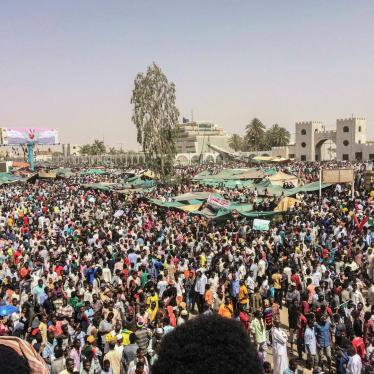Sudanese protesters were hopeful that the ouster of former president Omar al-Bashir would signal a break from 30 years of abuses. They spent over four months protesting in the streets despite violence by government forces that killed over 100 civilians and subjected many to unfair detentions and ill-treatment. Witnesses told us the National Intelligence and Security Service (NISS), Sudan’s intelligence agency, was at the forefront of those responsible for abuses against protesters.
After overthrowing al-Bashir in April, the new Transitional Military Council, vowed to restructure NISS in response to protesters’ demands. However, we have seen no reform of NISS and no justice for violations by its officers. Instead, Sudan’s de facto leaders have promoted the Rapid Support Forces (RSF).
These forces, which carried out abusive counterinsurgency campaigns in Darfur, Southern Kordofan, and Blue Nile since 2013, led the attack on the Khartoum sit-in on the morning of June 3, killing well over 100 protesters. They are now deployed in large numbers in Khartoum and other towns, using violence against protesters. Their commander, Lt. General Mohamed Hamdan Dagalo (“Hemedti”), is also deputy head of the Transitional Military Council, so the RSF is more powerful than ever before, with little reason to fear being held to account for violations and crimes against civilians.
Increasingly, they are starting to act like the NISS. For example, on June 20, the Sudanese Journalists Network reported that journalist Amar Mohamed Adam was arrested and detained by Rapid Support Forces officials, who handed him over to NISS after hours of questioning. RSF also detained employees from the health ministry and the National Oil Corporation who had staged a stand in front of their work premises in Khartoum, on June 20.
These forces have also prevented public events opposing the military council from taking place by occupying the designated locations hours before. They have also used force to disperse events, saying that organizers need permission from the Rapid Support Forces in advance, just as NISS had done.
It is clear that the Transitional Military Council has just given the NISS another name.







